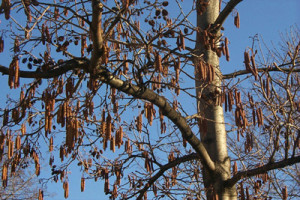Adler – Pruning, Winter Care and Fertilizing
Alder Speckled 
Note: Speckled Alder(incana) is a native to Wisconsin. Black Alder black alder (glutinosa) is a European native and should not be planted.
These trees should be pruned in fall after the leaves have dropped or in early spring, before the sap starts to flow (March). If needed, a few small branches can be removed in summer after the leaves have reached full size.
The time to make a long lasting effect on the form and structure of the plant is when the tree is young. Crossing or crowded branches should be removed. Low branches should also be removed, if desired, when the tree is young. This is best done by removing one or two branches a year, over a period of a few years, until the needed clearance is obtained. As the tree gets older, pruning every three to five years will keep the tree in good shape. As the tree gets larger, professional help may be required.
Newly planted trees respond very well to fertilization. Either granular, liquid or stake type fertilizers can be used. Granular fertilizers can be worked into the soil around the plant at a rate of 2 lbs or 2 pints per 100 square feet of planting bed. An alternative way to apply granular fertilizers starts with drilling or punching 6” deep holes at the drip line of the tree. Poured into these holes should be a total of 2 pounds of fertilizer per 1″ of trunk diameter (divided up and poured evenly between all of the holes). These holes should not be filled with more than 1/3 of the fertilizer and then they should be top filled with soil. This method of fertilization should only be done once a year, and is best done in late fall after leaf drop, or in early spring before the buds brake. Multi Purpose 10-10-10 fertilizer works well.
Liquid fertilizers (such as Miracle Gro) are mixed with water and applied the same as you would water the plant (see product for specific details). This should be done three or four times per year starting in late April and ending in mid July. Stake type fertilizers can be used following the directions on the package. With any of the above techniques, a higher nitrogen mix should be used; 20-20-20 or similar mix. Organic fertilizers, like manure, can also be used with good results. The material should be worked into open soil at a rate of one bushel per 1″ of trunk caliper or 100 square feet of bed area. As a tree matures, less fertilizing or lower nitrogen mixes should be used.
It is important to protect young trees from the winter sun. The trunks should be wrapped with a commercial grade tree wrap for the first two or three years. This wrap can be removed in the summer and then re-applied in fall.
